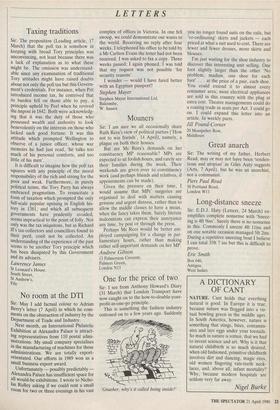LETTERS
Taxing traditions
Sir: The proposition (Leading article, 17 March) that the poll tax is somehow in keeping with broad Tory principles was unconvincing, not least because there was a lack of explanation as to what these might be. The omission was understand- able since any examination of traditional Tory attitudes might have raised doubts about not only the poll tax but this Govern- ment's credentials. For instance, when Pitt introduced income tax, he contrived that its burden fell on those able to pay, a principle upheld by Peel when he revived the impost in 1842. Both were acknowledg- ing that it was the duty of those who possessed wealth and authority to look benevolently on the interests on those who lacked such good fortune. It was this attitude which prompted Wellington to observe of a junior officer, whose war memoirs he had just read, 'he talks too much of his personal comforts, and too little of his men'.
It is difficult to imagine how the poll tax squares with any principle of the moral responsibility of the rich and strong for the poor and weak. Furthermore, in purely political terms, the Tory Party has always embraced pragmatism. To resuscitate a form of taxation which prompted the only full-scale popular uprising in English his- tory in 1381, and which all subsequent governments have prudently avoided, seems impractical to the point of folly. Not only was the tax iniquitous, but as Richard II's tax-collectors and councillors found to their peril, coult not be collected. An understanding of the experience of the past seems to be another Tory principle which has been dissipated by this Government and its advisers.
Lawrence James
St Leonard's House, South Street, St Andrew's, Fife


















































 Previous page
Previous page